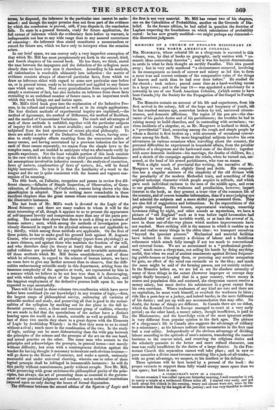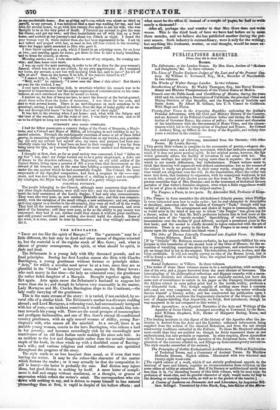MEMOIRS OF A CHURCH OF ENGLAND MISSIONARY IN THE NORTH
AMERICAN COLONIES.
Mn. MUSGRAVE, whose colonial life as a clergyman is narrated in this volume, was, by dint of books on geography, early smitten with " ro- mantic ideas concerning America"; and it was his boyish determination to settle in what he then thought an earthly Paradise. This idea passed away; but in very early manhood "a circumstance occurred, involving in its consequences so much of sorrow and misery as led him to form a more true and correct estimate of the comparative value of the things of heaven and earth than he had ever done before." He studied for the church ; took orders ; passed some time as a hard-working curate in a large town; and in the year 18— was appointed a missionary for a township in one of our North American Colonies, (which seems to have been Canada,) by the Society for the Propagation of the Gospel in Foreign Parts.
The Memoirs contain an account of his life and experiences, from his first arrival in the colony, full of the hope and buoyancy of youth, till he has reached mature age, somewhat broken by toil, narrowed circum- stances, and domestic afflictions. The topics of his pen are—the cha- racter of his parish duties and of his parishioners the troubles he had in raising money to build churches, and in contending with sectarians ; va- rious incidents of a singular, or, as Mr. Musgrave is inclined to think, of a "providential" kind, occurring among the rough and simple people by whom a district is first broken up ; with accounts of occasional conver- sions among his flock. The more biographical subjects involve his own adventures on various occasions when travelling about the country, the personal difficulties he experienced in household affairs, from the peculiar position of a clergyman and the backward state of the district; together with some domestic incidents—his marriage, the deaths of children &c. ; and a sketch of the campaign against the rebels, when he turned out, un- armed, at the head of his armed parishioners, who rose en masse.
With a slight touch of provincial fine writing, the narrative of Mr. Musgrave is very real, but slightly literal and feeble. His composi- tion has a singular mixture of the simplicity of the old divines with the peculiarity of the modern Methodist tract, and something of that original unkempt character which people acquire in solitude, and which gave such individual raciness to the men of the middle ages, and even to our grandfathers. His weakness and peculiarities, however, impart interest to the book, as they present a truer view of the common life of the country, and of course homelier information, than if a more judging eye had selected the subjects and a more skilful pen presented them. They are also full of suggestions and intimations. In the superstitions of the people respecting haunted houses, supernatural warnings, unearthly horsemen riding by night, and other sounds as mysterious, we have a picture of "old England" such as it was before rapid locomotion had banished the belief of the invisible world, or at least the avowal of it, save in those out-of-the-way places which modern improvements have not reached. More striking still is the manner in which it enables us to read and realize many things in the olden time : we transport ourselves "beyond the ignorant present." Mechanical and material facilities have induced in this country a division of labour and a fastidious refinement which attach fully enough if not too much to conventional and external forms. We are so accustomed to a "professional gentle- man," much more a clergyman, not soiling his hands by doing anything useful, that when we read of ancient enactments against divines frequent- ing public-houses or keeping them, or pursuing any secular occupation for gain, no effort of the mind can reconcile us to the idea • and much the same might be said of the farming parson, not yet entirely extinct. In the Memoirs before us, we are led to see the absolute necessity of many of these things in the outset (however improper or corrupt they might finally become) • and that in a poor country, where money is scarce and population thin and scattered, the clergyman cannot receive a money salary, but must derive his subsistence to a great extent from his own exertions. Where tradesmen of any kind are rare and there are no capitalists, he must work himself, or overlook the workmen he hires; ride like a post-boy or a jockey, and indeed harder, in the mere fulfilment of his duties ; and put up with any accommodation that may offer. No doubt, the forms of things are different. In Canada there are no tithes, which the Romish Church in Europe managed to exact at a very early period ; on the other hand, a money salary, though insufficient, is paid to the Missionaries; and the knowledge even of the most ignorant settler is very different from popular opinion in the dark ages. The picture of a clergyman's life in Canada also suggests the advantage of celibacy to a missionary; as his labours indicate that monasteries in the first case had a real utility. Independently of the obvious advantage of dividing labour according to the aptitude of men's natures transferring the coarser business to the coarser mind, and reserving ate religious duties and the scholarly pursuits to the better and more refined character, one man was really insufficient for the duties of a large district. In the Pro- testant Church this separation cannot well take place ; and in new or poor countries a divine must become something like a jack-of-all-trades,— with no great advantage, we suspect, to his intellect or his delicacy.
These opinions will be best tested by a perusal of the book : the proper extracts to support them fully would occupy more space than we can spare; but here is one.
A CLERGYMAN'S DOTY IN A COLONY.
On one occasion I was called upon one Saturday morning, I well remember it yet, to marry a couple at a settlement fifteen miles ofE I started very early, and back about five o'clock in the evening, weary and almost worn out, more by excessive heat than by the length of the journey; and was very thankful to return ,tromyeomfortable illOme. But on giving my-horae, vrhich was about as tired as myself, to my servant, I was informed that a man was waiting for me, and had been for several hours, to go with him twenty-five miles to see his wife, who was thought to be at the very point of death. I directed my servant to give the man his dinner, and got my own- and then immediately set off with him on a fresh -horse, and arrived at my journey's end about ten o'clock at night. I found the poor woman very ill, worse indeed than she had been represented to be. I sat up and talked and prayed with her, or read to her, till four o'clock in the morning; when her happy spirit amended to Him who gave it. - I then threw myself on a sofa, which I found luau adjoining room, for an hour or two-'. and starting again for home, got there in time to take a hasty breakfast, and to dress for church, at eleven.
Morning service over, I rode nine miles to one of my outposts, for evening ser- vice; and then home once more.
I was up early the next morning, in order to be off in time for the poor woman's funeral, Which was to be at ten o'clock, by _my own appointment. As I mounted my horse, my servant, a raw bat well-meaning Irish lad, said to me—" An is% off agin ye are? Snre -an the horses '11 be kilt, if the maister hisself is et." I cannot help it, John," I replied; "I must go."
• "Well, well I' he rejoined; "I never seen the likes o' this afore ! But there's .no rest for the wicked, I see."
I cast upon him amarching look, to ascertain whether his remark was to be imputed to impertinence: but the simple expression of commiseration on his corm- "teirance at once amvirrced me that he meant-no harm.
.I pushed en, for fear of being too late, to meet the funeral at. the burial-ground, about three miles from the house of mourning. I was there far too soon, and sisid..to Wait several hones. There is an unwillingness on such occasions to be .punetual; arising, I am inclined to believe, from the fear of being guilty of an on- - due and disrespectful haste "to bury their dead out of their sight."
" It was late in the evening when I got home; and, what with the fatigue and lila heat of the weather, and the want of rest, I was fairly worn out, and so ill -mato be obliged to keep my room for three days.
etTR/OSITY AND 4100D CIYMPANY.
• I had fellow passengers a cotmtry Judge of the Court of Requests, a Magi.s- Arista and a Colonel and Major of Militia, all belonging to and residing in my in- -tended mission. Through the indefatigable exertions of some or all of these titled ,gentrp,in examining the partially-defaced directions on my trunks, and question-
ing only my servant but myself i also_, my name and purpose had been sue- ressffilly made out before I had been an hour n their company. I was far from • being sorry for this, as I received from them the most marked and flattering at- tentions. * • * •
I thought at first, that, as far as good society was concerned, I had "fallen on _my feet ". but, alas ! my Judge turned out to be a petty shopkeeper, a doter out of drams to the drunken raftsmen; the Magistrate, an old rebel soldier of the United States, living upon a pension of 20/. a year from that Government as the .barard of his treason, and at the mine time holding a commission of the peace *ander the one against which he had successfully fought, The Colonel, the most *tasspeotable of my digned companions, had been a sergeant in the — regi- . ment, and was now living upon his pension of a shilling a day; and to complete :ray catalogue, the Major was the jolly landlord of a paltry village-tavern.
COLONIAL POVERTY.
The people belonging to the Church, although more numerous than those of • any other single denomination, were still very few • slid the first time I adminis- ' tend the holy somnolent of the Lord's Supr, had only nine communicants. They were also very' poor, as new settlers -1 ..411-rally are; and this was compare- - tively, with the exception of the small village, a new settlement; and yet, strange as it may appear to a dweller in the old country, they were all well off in the world. They had all the necessaries and comforts of life at their command, and even some of the luxuries: still they were poor, as far as the ability to pay money was 'concerned; they had it not, neither could they obtain it without great exertions, and still greater sacrifices; and nothing else would build the church. Some of the work, it is true, could be done by themselves; and they willingly and freely did it.



























 Previous page
Previous page